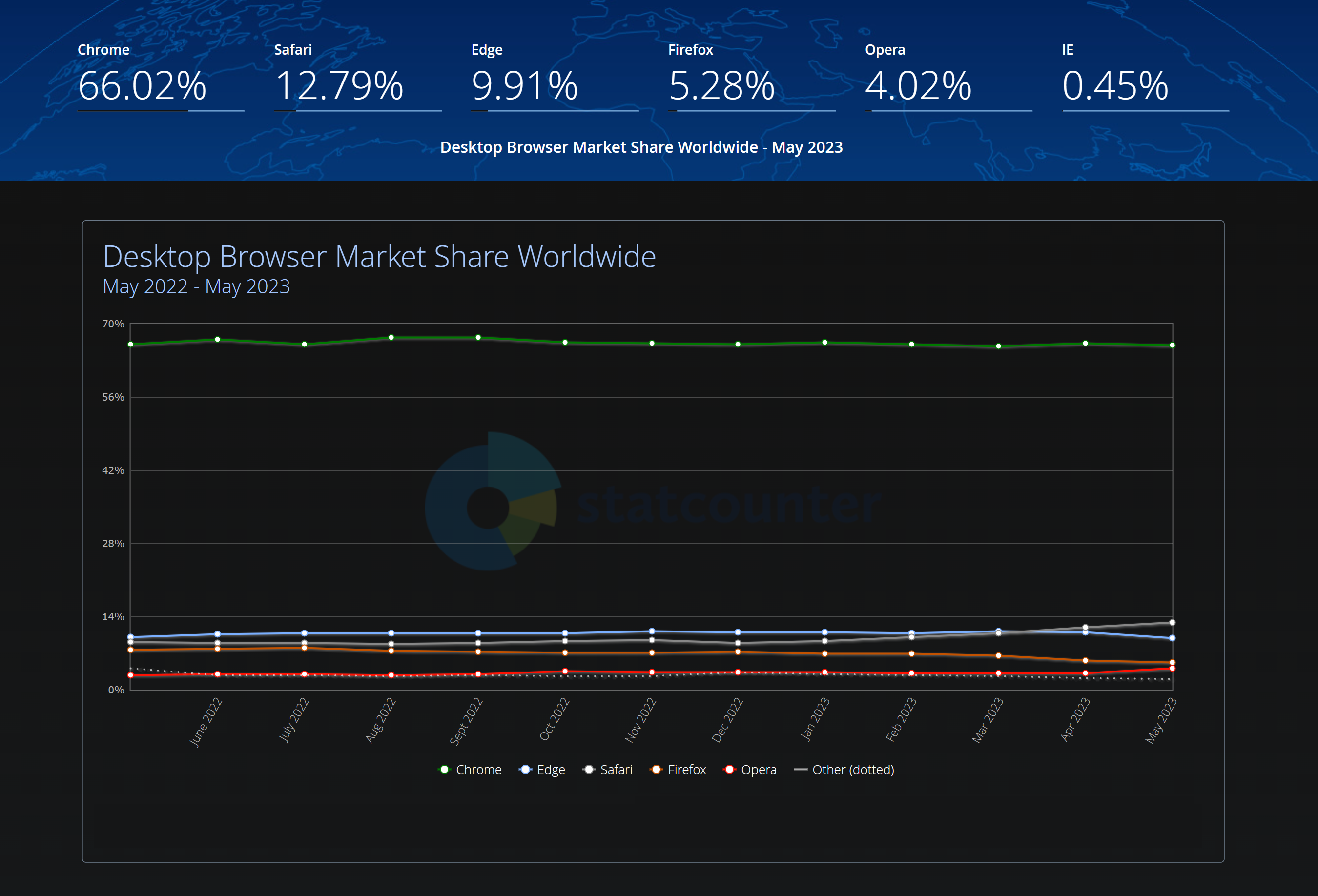With the arrival of June 2023, the U.S.-based web traffic analyst firm StatCounter has released its monthly report highlighting the progress reports of different search engines.
As per the stats, Google’s Chrome continued to lead the chart. The desktop version had more than sixty-six percent share even after losing 0.2 points last month.
On the other hand, Safari, an Apple-owned engine, is getting itself adjusted to its latest position as it successfully took over Microsoft-owned Edge two months ago. Safari was able to increase its user community as the stats went up from almost twelve percent to thirteen percent. Whereas Edge came down from ten percent to 9.91 percent.
The decline in Microsoft Edge’s market share could be attributed to several factors. One possible reason is the increasing competition from other browsers, such as Google Chrome and Mozilla Firefox, which have managed to capture a larger share of the market. Additionally, the perceived performance issues and compatibility concerns associated with Microsoft Edge may have played a role in its dwindling user base.
In contrast, Safari’s continued growth can be attributed to Apple’s thriving ecosystem. The built-in web browser, Safari, is automatically installed on every Apple device, including iPhones and Macs, giving it a significant advantage in terms of user adoption. With Apple’s strong customer base and seamless integration with its other products and services, Safari has managed to attract a loyal user community.
Similarly, Mozilla Firefox was also unable to increase its numbers. Instead of going up, the engine went further down, from almost 5.6 percent to 5.3 percent. As compared to last year, the engine had a share of around eight percent.
Shifting to the engines available on mobile phones, Google Chrome leads the table with an almost 61 percent share, followed by Safari, which holds 27.81 percent. Samsung’s own Samsung Internet gained almost 0.14 points and earned a share of approximately 5 percent.
The browser market remains highly competitive, with different players contending for a larger slice of the user base. Each browser offers unique features, security measures, and compatibility options, leading users to make choices based on their preferences and requirements.
Read next: As Earth Overshoot Day Approaches, These Countries Act as Role Models
As per the stats, Google’s Chrome continued to lead the chart. The desktop version had more than sixty-six percent share even after losing 0.2 points last month.
On the other hand, Safari, an Apple-owned engine, is getting itself adjusted to its latest position as it successfully took over Microsoft-owned Edge two months ago. Safari was able to increase its user community as the stats went up from almost twelve percent to thirteen percent. Whereas Edge came down from ten percent to 9.91 percent.
The decline in Microsoft Edge’s market share could be attributed to several factors. One possible reason is the increasing competition from other browsers, such as Google Chrome and Mozilla Firefox, which have managed to capture a larger share of the market. Additionally, the perceived performance issues and compatibility concerns associated with Microsoft Edge may have played a role in its dwindling user base.
In contrast, Safari’s continued growth can be attributed to Apple’s thriving ecosystem. The built-in web browser, Safari, is automatically installed on every Apple device, including iPhones and Macs, giving it a significant advantage in terms of user adoption. With Apple’s strong customer base and seamless integration with its other products and services, Safari has managed to attract a loyal user community.
Similarly, Mozilla Firefox was also unable to increase its numbers. Instead of going up, the engine went further down, from almost 5.6 percent to 5.3 percent. As compared to last year, the engine had a share of around eight percent.
Shifting to the engines available on mobile phones, Google Chrome leads the table with an almost 61 percent share, followed by Safari, which holds 27.81 percent. Samsung’s own Samsung Internet gained almost 0.14 points and earned a share of approximately 5 percent.
The browser market remains highly competitive, with different players contending for a larger slice of the user base. Each browser offers unique features, security measures, and compatibility options, leading users to make choices based on their preferences and requirements.
Read next: As Earth Overshoot Day Approaches, These Countries Act as Role Models


